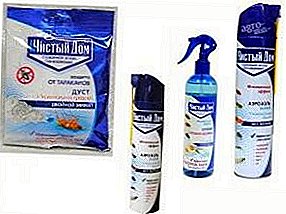 The diet of young laying hens should be complete and balanced. For this, the owners add various vitamins and microelements to their food. One of the most important supplements is fish oil - the source of development and growth of young birds. Let's take a closer look at what the chickens need it for, how to give it correctly, what contraindications and side effects can be.
The diet of young laying hens should be complete and balanced. For this, the owners add various vitamins and microelements to their food. One of the most important supplements is fish oil - the source of development and growth of young birds. Let's take a closer look at what the chickens need it for, how to give it correctly, what contraindications and side effects can be.
Composition and release form
Fish oil is prepared from the liver and other fish viscera. It is packaged in dark glass bottles of 100 milliliters and in dark plastic bottles of 500 milliliters. It is an oily liquid that has a yellow color and a faint fishy smell.
We advise you to read about how to give bran, meat and bone meal and yeast to chickens, and whether it is possible to give bread and foam plastic to chickens.
The composition of the additive is as follows:
- Omega 3-6-9;
- docosahexaenoic and eicosapentaenoic fatty acids;
- vitamin D;
- Vitamin A (898 IU per 1 g of the drug).

Why do chickens need fish oil
This additive has a number of positive properties. When used correctly and regularly, it will:
- increase immunity to various diseases;
- positive effect on growth and development;
- relieve chickens from gastrointestinal disorders, anemia and allergies;
- increase the quality and quantity of eggs in laying hens;
- will form a strong musculoskeletal system of broilers;
- improve the hematopoietic system.
Important! If birds are grown all year round in cages, they need constant feeding with fish oil.
Can chickens be given liquid fish oil
Of course, it is impossible to give this drug to chickens as a drink. It is diluted in the ratio of 1 to 2 in warm water, and then added to the mash or finished feed. Most often, birds are given this supplement in this way, but you can also offer them crushed capsules. 
How and how much to give to chickens: dosage
For chickens, the correct dose is 0.2 ml of the product per head, but when they grow up, the dose is increased to 0.5 milliliters. The drug can be given to chickens from the 5th day of life.
Did you know? The smallest egg in the world weighing only 9.743 grams was laid by record-breaking chicken from Papua New Guinea.
For broilers, the dosage is double, as they have twice the mass than ordinary chickens. You need to start the same way as with chickens - from 0.2 milliliters of money per day, but as you grow, increase the dosage and reach 1 ml of the drug per day. Broiler chickens can take up to 5 milliliters of money per day, depending on the weight.
Read more about how to germinate wheat for chickens, what types of feed there are, as well as how to make mash and feed for chickens.
It is necessary for the laying hens, like the chickens, to start with 0.2 ml of the preparation and go to 0.5 ml of the supplement per day. Daily fish oil should not be added to feed or mash.
Video: how to give fish oil to chickens Poultry farmers are advised to take the drug a week after a week. In summer and at the beginning of autumn there is no need to give this supplement to the birds if there are walks in the fresh air in their life with a pinching of grass. For such individuals, taking the drug is relevant in winter and spring.
Important! Do not add the drug to the feed every day without interruption - it will cause diarrhea, poor health and illness in the bird.
special instructions
Eggs of laying hens during the supplementation can be eaten without fear. But to send a bird for slaughter is only after a week break from the use of vitamins. If you kill and cook the chicken earlier, the meat will have a strong smell of fish.
Contraindications and side effects
There are no contraindications to the use of this remedy. 
Side effects can occur only if:
- chickens consumed an expired product;
- The rules for taking the drug were not followed.
In such cases, the birds feel worse, diarrhea appears.
We recommend reading about the advantages and disadvantages of keeping chickens in cages, whether a rooster is needed for the chickens to carry the eggs, why the chickens peck the rooster and each other, when the chickens of the youngsters begin to trot, what to do if the chickens do not carry well and peck the eggs.
Shelf life and storage conditions
The product is stored in its original packaging made of dark material (glass, plastic). It is necessary to protect the additive from direct sunlight.
Important! Under the influence of light, vitamin D in the composition of this additive is converted into a toxic substance, and vitamin A is destroyed.The temperature at the storage location should be no more than + 30 ° C. Subject to the rules of storage, the drug is valid for one year from the date of manufacture.

A complete diet is the engine of growth and development for any kind of living thing. Adding fish oil to bird feed will improve their health, increase immunity to disease and egg production. The main thing - follow the instructions for use and properly store the drug.
Did you know? There are three types of fish oil: dark (for technical purposes), yellow (used in medicine, additionally cleaned), white (suitable for medical purposes without cleaning).
Reviews from the network














